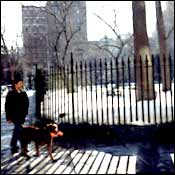clerestory - noun - an outside wall of a room or building that rises above an adjoining roof and contains windows
Probably one of the more important pieces of architecture, thinking primarily of ancient churches, palaces, or other large governemnt buildings is the clerestory (the clear story). This is how a building of vast dimensions was light. Candles just couldn't handle the load. Imagine being in Notre Dame or the Malmesbury Abbey and trying to read your sermon notes, or, if you happened to be lucky enough to be in the orchestra, your music. Buildings without windows are dark buildings indeed and it takes a lot of candles to even raise the light level enough to be tolerable to ambulate sans tripping. Windows and daylight are a much better solution. Then the problem is: how to get light in without blinding the people. The answer: put the windows way up high so the light comes down to the floor of the building without distracting people with a nice view to the outdoors and not having the sunlight full in their eyes as they peer toward the altar.
Thursday, August 31, 2006
ambulatory
ambulatory - adj. - moving from place to place, itinerant; able to walk about and not bedridden
It seems like this word would mean the opposite. Maybe I need to do some research and learn suffixes such as "ory." Perhaps if I knew the meaning of "ory" I would not think the definition as backwards. If only people would wisen up and ask me for my opinion before making such importance decisions then things would be so much simpler (and no, I'm not really that arrogant).
It seems like this word would mean the opposite. Maybe I need to do some research and learn suffixes such as "ory." Perhaps if I knew the meaning of "ory" I would not think the definition as backwards. If only people would wisen up and ask me for my opinion before making such importance decisions then things would be so much simpler (and no, I'm not really that arrogant).
churl
churl - n - A rude, boorish, or surly person; a peasant, rustic.
This one shows up in Shakespeare (in the second sense), and it's a useful word to have in your vocabulary.
This one shows up in Shakespeare (in the second sense), and it's a useful word to have in your vocabulary.
Wednesday, August 30, 2006
nave
nave - noun - the hub of a wheel; the main part of the interior of a church, especially the long narrow central hall in the cruciform church that rises higher than the aisles flanking it to form a celestory.
This is the central approach to the altar and is meant to inspire both a feeling of smallness (the ceilings are usually extremely high) and a sense of wonder at the same time. From the entrance of the nave, the altar is usually in plain sight. The nave was the place reserved for the commoners, which, in some way, explains the colloquial use of the word to describe a low-born or unsophisticated person, usually male and usually young (a boy).
This is the central approach to the altar and is meant to inspire both a feeling of smallness (the ceilings are usually extremely high) and a sense of wonder at the same time. From the entrance of the nave, the altar is usually in plain sight. The nave was the place reserved for the commoners, which, in some way, explains the colloquial use of the word to describe a low-born or unsophisticated person, usually male and usually young (a boy).
gramercy
Tuesday, August 29, 2006
transept
transept - noun - the part of a cruciform church that crosses at right angles to the greatest length between the nave and the apse or choir.
This is usually the north and south portion of the church, as the altar usually lies in the east. The arms of the transept often contain separate chapels . The part of the transept the directly intersects the main aisle is called the crossing, for obvious reasons.
This is usually the north and south portion of the church, as the altar usually lies in the east. The arms of the transept often contain separate chapels . The part of the transept the directly intersects the main aisle is called the crossing, for obvious reasons.
quarto
quarto - n - A book size of 9.5 x 12 inches, determined by folding printed sheets twice to form four leaves or eight pages.
At least 18 of Shakespeare's plays were published in quarto editions during his lifetime. He played no role in their preparation, and he never saw a penny in royalties, which seems incredible to those who live in a time when Stephen King, Dan Brown, and John Gresham could live lives of luxury on their royalties.
The folios create a problem for Shakespeare scholars; in fact, they're probably the main reason there are Shakespeare scholars in the first place. For example, Juliet's balcony soliloquy is available in two quarto editions and the First Folio. All three versions differ slightly, which gives rise to the question, "What did Shakespeare actually write?" Moreover, these plays were scripts for actors, so there's the next question, "What was finally recited on stage?" This is probably yet another never-ending story.
At least 18 of Shakespeare's plays were published in quarto editions during his lifetime. He played no role in their preparation, and he never saw a penny in royalties, which seems incredible to those who live in a time when Stephen King, Dan Brown, and John Gresham could live lives of luxury on their royalties.
The folios create a problem for Shakespeare scholars; in fact, they're probably the main reason there are Shakespeare scholars in the first place. For example, Juliet's balcony soliloquy is available in two quarto editions and the First Folio. All three versions differ slightly, which gives rise to the question, "What did Shakespeare actually write?" Moreover, these plays were scripts for actors, so there's the next question, "What was finally recited on stage?" This is probably yet another never-ending story.
Monday, August 28, 2006
apse
apse - noun - a projecting part of a building (as a church) that is usually semicircular in plan and vaulted.
Apse is NOT a groupe of Apes! Just thought I'd point that out. Anyway, this architecutral structure was a common method of holding up the roof on the end of a building, or, less frequently, both ends. The fetish with round vaulted roof structures was more one of function, the vaults all supported each other, and the roundness created a feeling of being open. They also let in more light more uniformly than the vaults down the length of the aisle of the building.
Apse is NOT a groupe of Apes! Just thought I'd point that out. Anyway, this architecutral structure was a common method of holding up the roof on the end of a building, or, less frequently, both ends. The fetish with round vaulted roof structures was more one of function, the vaults all supported each other, and the roundness created a feeling of being open. They also let in more light more uniformly than the vaults down the length of the aisle of the building.
squib
squib - n. - a short humorous or satiric writing or speech, a short news item; a small firecracker in which the powder burns with a fizz; a small electric or pyrotechnic device used to ignite a charge
Another fun Harry Potter word. I've been surprised when looking things up that she (J.K. Rowling) uses in her books because even though they sound bizarre a lot of her ideas are based on real things. This one, however, is not. A squib in her books is someone born of magical parents but doesn't have any magicial abilities of their own.
Sorry I disappeared for a short while. I'm back.
Another fun Harry Potter word. I've been surprised when looking things up that she (J.K. Rowling) uses in her books because even though they sound bizarre a lot of her ideas are based on real things. This one, however, is not. A squib in her books is someone born of magical parents but doesn't have any magicial abilities of their own.
Sorry I disappeared for a short while. I'm back.
marry

marry - interj - Short form of "By the Virgin Mary." A mild oath, used as an exclamation of surprise or emphasis.
"Marry, will Kavanagh's Shakespeare obsession never cease?"
I've just finished reading for the second time Shakespeare's most despised play, Titus Andronicus. You remember splatter movies; well TA is a splatter play.
A reasonable guess for Shakespeare's source might be the Greek legend of Tereus, Procne, and Philomela, as recounted in Ovid's (Publius Ovidius Naso) Metamorposes. Tereus took a shine to his wife Procne's sister Philomela, raped Philomela, and, to conceal his crime, cut out her tongue and moved her in with the rest of his slaves. The resourceful Philomela wove a tapestry in which she identified her molester. When Procne saw the tapestry, she murdered her and Tereus's son, Itys, and fed her husband some choice cuts taken from the body. This legend seems almost restrained compared to what Shakespeare did with it. I don't know how much Shakespeare you've read, Natalie, but I'd hold off on this one for a while. (By the way, have either of you seen the movie version from a few years back with Anthony Hopkins as Titus?)
(The illustration reproduces - badly - Peter Paul Rubens's painting of Procne confronting Tereus with their son's head.)
Friday, August 25, 2006
basilica
basilica - noun - an oblong building ending in a semicircular apse used in ancient Rome especially for a court of justice and place of public assembly; an early Christian church building consisting of nave and aisles with clerestory and a large high transept from which an apse projects.
A fascinating structure to say the least. Especially how they were constructed. Creating one of these vaulted buildings was no mean feat in ancient Rome, yet we see them all over the place. They were quite the fad thing to do in ancient architecture.
A fascinating structure to say the least. Especially how they were constructed. Creating one of these vaulted buildings was no mean feat in ancient Rome, yet we see them all over the place. They were quite the fad thing to do in ancient architecture.
folio

folio - n - A large sheet of paper folded once to make two leaves, or four pages, of a book or manuscript; a volume having pages of the largest size (about 15 inches), formerly made from such a sheet.
Many of Shakespeare's plays were published in smaller (quarto) editions during his lifetime, but these were what today would be considered pirated editions. Moreover, Shakespeare did not have any say in these publications, so their quality is erratic to say the least. His complete plays were first published in 1623, in what is now known as the First Folio; others were to follow. These different editions are why there were - and still are - Shakespeare scholars; the burning question continues to be, "What did Shakespeare actually write, and what was finally performed. To give just one example out of many possible, there's a soliloquy in Hamlet that begins, "Oh, that this too too solid flesh would melt. . ." One edition I've seen renders that as, "Oh, that this too too sullied flesh would melt. . ." The story continues, offering yet another proof that Shakespeare was not just for his time, but for the ages.
Thursday, August 24, 2006
recusant
recusant - n - Refusing to submit, comply, etc.; obstinate in refusal; refusing to attend services in the Church of England.
Virtually nothing is known of Shakespeare's early life. There's a baptismal record, bans posted for his marriage to Anne Hathaway, birth records for three children (Susanna and the twins Hamnet and Judith), and little but rumor until his name pops up in London in 1592 (There's substantial evidence that he'd already been there for a few years though). Today's word comes up because there is a generally discredited notion that he may have been a recusant Catholic.
Virtually nothing is known of Shakespeare's early life. There's a baptismal record, bans posted for his marriage to Anne Hathaway, birth records for three children (Susanna and the twins Hamnet and Judith), and little but rumor until his name pops up in London in 1592 (There's substantial evidence that he'd already been there for a few years though). Today's word comes up because there is a generally discredited notion that he may have been a recusant Catholic.
Wednesday, August 23, 2006
swamped
swamped - adj - sunk by being filled with water; rendered powerless, especially by an excessive amount or profusion of something
broil
broil - n - A rowdy argument; a brawl.
Here's another entry in my Shakespeare glossary. Think of Montagues and Capulets in the sunny streets of Verona, or Plug Uglies and Bowery Boys in the grimy streets of New York City.
Aside to Jeff and Natalie: Am I here all alone? I've been talking to myself for years, but I'd really welcome hearing from the rest of our small, select circle.
Here's another entry in my Shakespeare glossary. Think of Montagues and Capulets in the sunny streets of Verona, or Plug Uglies and Bowery Boys in the grimy streets of New York City.
Aside to Jeff and Natalie: Am I here all alone? I've been talking to myself for years, but I'd really welcome hearing from the rest of our small, select circle.
Tuesday, August 22, 2006
archaic
archaic - adj - Of, relating to, or characteristic of a much earlier, often more primitive period, especially one that develops into a classic stage of civilization.
I'm still plugging Shakespeare.
One of the obstacles to a modern reader's enjoyment of Shakespeare is his language, which is generously peppered with obsolete or archaic words. For an example of the former, there's "sirrah," which I used yesterday. For an example of the latter, there's "fond," which in Shakespeare's time meant "foolish." That's why most editions of his works are heavily footnoted. It's hard to enjoy a play when you must constantly be glancing at the bottom of a page (or a facing page) to get a definition, but there's a simple solution: read more Shakespeare, and you'll find yourself growing accustomed to his Elizabethan English. How say you?
I'm still plugging Shakespeare.
One of the obstacles to a modern reader's enjoyment of Shakespeare is his language, which is generously peppered with obsolete or archaic words. For an example of the former, there's "sirrah," which I used yesterday. For an example of the latter, there's "fond," which in Shakespeare's time meant "foolish." That's why most editions of his works are heavily footnoted. It's hard to enjoy a play when you must constantly be glancing at the bottom of a page (or a facing page) to get a definition, but there's a simple solution: read more Shakespeare, and you'll find yourself growing accustomed to his Elizabethan English. How say you?
Monday, August 21, 2006
sirrah

sirrah - n - Formerly a contemptuous term of address to a man or boy; often used in anger.
And often used by Shakespeare's characters.
Inspired by Jeff, I have begun reading - or rereading - William Shakespeare's (1562-1614) complete works. I'm working my way from earliest to latest plays, after which I'll dive into the sonnets and poems.
It's not clear in most cases when exactly Shakespeare wrote a given play, but the best educated guesses indicate the first were The Comedy of Errors, Love's Labors Lost, and 2 Henry VI, so I started with 1 Henry VI, and will continue with the second and third parts before moving on to the early comedies.
Jeff, you once suggested a readers blog. Would Shakespeare be suitable?
Friday, August 18, 2006
inane

inane - adj - Lacking sense or substance.
Like this guy here.
I'll admit I laugh at the latest Bushisms, but I also cringe when I hear him speak. Bush had hardly begun his first term when some wit correctly stated that "It's sad when the President of France and the King of Jordan speak better English than the President of the United States." To what do we attribute this disorder? It's not lack of brainpower. Steve Sailer has persuasively argued that Bush's IQ is in the neighborhood of 125. He has also argued, equally persuasively, that Bush is the most intellectually lazy man ever to occupy the White House.
Wednesday, August 16, 2006
chiliasm
chiliasm - n - The doctrine stating that Jesus will reign on Earth for 1,000 years.
Are either of you chiliasts? It's not part of my theology, but I'd be interested in gaining some insight into this belief.
Are either of you chiliasts? It's not part of my theology, but I'd be interested in gaining some insight into this belief.
Tuesday, August 15, 2006
arrogate
arrogate - verb - to claim or seize without right or justification; to appropriate; to claim on behalf of another; to ascribe
This raises the question about Jacob, did he arrogate Esau's blessing? My take is yes.
This raises the question about Jacob, did he arrogate Esau's blessing? My take is yes.
geocentric

geocentric - adj - Relating to, measured from, or with respect to the center of the earth; Having the Earth as a center.
The solar system and the "fixed stars" were believed to orbit geocentrically, meaning that they revolved around the Earth. The main proponent of this view was Ptolemy (Claudius Ptolemaius) of Alexandria (c. 90 - c. 168, see illustration), who expounded on the geocentric theory in his Almagest, one of the greatest intellectual works in history - it's only failing being that it's wrong. Polish canon Nicolaus Copernicus (1473-1543) was the first to put forth the heliocentric theory, viz., that the Earth and other planets revolved around the sun in his book De Revolutionis Orbium Coelestium (On the Revolutions of the Heavenly Bodies). That was a step in the right direction, but Copernicus and later Galileo Galilei (1564-1642) believed that the planetary orbits were circular. It was Johannes Kepler (1571-1630) who finally demonstrated that the orbits were elliptical.
Monday, August 14, 2006
eremite
eremite - noun - a hermit, especially a religious recluse
I'll defer to John to discuss this word. For what ever reason though, this word is too close to termite for me not to have some humorous moments with it.
I'll defer to John to discuss this word. For what ever reason though, this word is too close to termite for me not to have some humorous moments with it.
licentious

licentious - adj - Lacking moral discipline or ignoring logal restraint, especially in sexual conduct.
What can I possibly say? Except maybe that "If it feels good, do it" will always be an easier sell than Samuel Johnson's "He who makes an animal of himself loses only the pain of being a man."
And now for another of Johnny Kavanagh's favorite poems! This one's by Vachel Lindsay (1879-1931); it's called General William Booth Enters Into Heaven. I'd have preferred to use The Congo, but my nerve failed me.
(NB: Lindsay's poems are meant to be performed.)
General William Booth Enters into Heaven
[To be sung to the tune of The Blood of the Lamb with indicated instrument]
I
[Bass drum beaten loudly.]
Booth led boldly with his big bass drum --
(Are you washed in the blood of the Lamb?)
The Saints smiled gravely and they said: "He's come."
(Are you washed in the blood of the Lamb?)
Walking lepers followed, rank on rank,
Lurching bravoes from the ditches dank,
Drabs from the alleyways and drug fiends pale --
Minds still passion-ridden, soul-powers frail: --
Vermin-eaten saints with mouldy breath,
Unwashed legions with the ways of Death --
(Are you washed in the blood of the Lamb?)
[Banjos.]
Every slum had sent its half-a-score
The round world over. (Booth had groaned for more.)
Every banner that the wide world flies
Bloomed with glory and transcendent dyes.
Big-voiced lasses made their banjos bang,
Tranced, fanatical they shrieked and sang: --
"Are you washed in the blood of the Lamb?"
Hallelujah! It was queer to see
Bull-necked convicts with that land make free.
Loons with trumpets blowed a blare, blare, blare
On, on upward thro' the golden air!
(Are you washed in the blood of the Lamb?)
II
[Bass drum slower and softer.]
Booth died blind and still by Faith he trod,
Eyes still dazzled by the ways of God.
Booth led boldly, and he looked the chief
Eagle countenance in sharp relief,
Beard a-flying, air of high command
Unabated in that holy land.
[Sweet flute music.]
Jesus came from out the court-house door,
Stretched his hands above the passing poor.
Booth saw not, but led his queer ones there
Round and round the mighty court-house square.
Then in an instant all that blear review
Marched on spotless, clad in raiment new.
The lame were straightened, withered limbs uncurled
And blind eyes opened on a new, sweet world.
[Bass drum louder.]
Drabs and vixens in a flash made whole!
Gone was the weasel-head, the snout, the jowl!
Sages and sibyls now, and athletes clean,
Rulers of empires, and of forests green!
[Grand chorus of all instruments. Tambourines to the foreground.]
The hosts were sandalled, and their wings were fire!
(Are you washed in the blood of the Lamb?)
But their noise played havoc with the angel-choir.
(Are you washed in the blood of the Lamb?)
O shout Salvation! It was good to see
Kings and Princes by the Lamb set free.
The banjos rattled and the tambourines
Jing-jing-jingled in the hands of Queens.
[Reverently sung, no instruments.]
And when Booth halted by the curb for prayer
He saw his Master thro' the flag-filled air.
Christ came gently with a robe and crown
For Booth the soldier, while the throng knelt down.
He saw King Jesus. They were face to face,
And he knelt a-weeping in that holy place.
Are you washed in the blood of the Lamb?
Friday, August 11, 2006
piebald - adj - having spots and patches of black and white, or other colors; mottled; mixed; composed of incongruous parts
I always think of horses when I come across this word. Wikipedia suggests this word is used to especially describe horses.
http://en.wikipedia.org/wiki/Image:Pookie.jpg
I always think of horses when I come across this word. Wikipedia suggests this word is used to especially describe horses.
http://en.wikipedia.org/wiki/Image:Pookie.jpg
abet
abet - v. - to actively second and encourage (as an activity or plan), forward; to assist or support in the achievement of a purpose
Thursday, August 10, 2006
animus
animus - noun - Basic attitude or animating spirit; disposition; intention; a feeling of ill will; animosity; in Jungian psychology, the inner masculine part of the female personality
malevolent
malevolent - adj. - having, showing, or arising from intense often vicious ill will, spite, or hatred; productive of harm or evil
Muuuuaaaaaaaaaahhhahahahaaaa!
Muuuuaaaaaaaaaahhhahahahaaaa!
fray
fray - n - A suffle; a brawl.
Speaking of frays, here's a piece of Romeo and Juliet, Act III, Scene I. Romeo's friend Mercutio has been mortally wounded by Juliet's brother Tybalt. Romeo had been trying to prevent the swordplay.
MERCUTIO
I am hurt.A plague o' both your houses! I am sped. Is he gone, and hath nothing?
BENVOLIO
What, art thou hurt?
MERCUTIO
Ay, ay, a scratch, a scratch; marry, 'tis enough.Where is my page? Go, villain, fetch a surgeon.
Exit Page
ROMEO
Courage, man; the hurt cannot be much.
MERCUTIO
No, 'tis not so deep as a well, nor so wide as a church-door; but 'tis enough,'twill serve: ask for me tomorrow, and you shall find me a grave man. I am peppered, I warrant, for this world. A plague o'both your houses! 'Zounds, a dog, a rat, a mouse, a cat, to scratch a man to death! a braggart, a rogue, a villain, that fights by the book of arithmetic! Why the devil came you between us? Iwas hurt under your arm.
ROMEO
I thought all for the best.
MERCUTIO
Help me into some house, Benvolio,Or I shall faint. A plague o' both your houses!They have made worms' meat of me: I have it,And soundly too: your houses!
Speaking of frays, here's a piece of Romeo and Juliet, Act III, Scene I. Romeo's friend Mercutio has been mortally wounded by Juliet's brother Tybalt. Romeo had been trying to prevent the swordplay.
MERCUTIO
I am hurt.A plague o' both your houses! I am sped. Is he gone, and hath nothing?
BENVOLIO
What, art thou hurt?
MERCUTIO
Ay, ay, a scratch, a scratch; marry, 'tis enough.Where is my page? Go, villain, fetch a surgeon.
Exit Page
ROMEO
Courage, man; the hurt cannot be much.
MERCUTIO
No, 'tis not so deep as a well, nor so wide as a church-door; but 'tis enough,'twill serve: ask for me tomorrow, and you shall find me a grave man. I am peppered, I warrant, for this world. A plague o'both your houses! 'Zounds, a dog, a rat, a mouse, a cat, to scratch a man to death! a braggart, a rogue, a villain, that fights by the book of arithmetic! Why the devil came you between us? Iwas hurt under your arm.
ROMEO
I thought all for the best.
MERCUTIO
Help me into some house, Benvolio,Or I shall faint. A plague o' both your houses!They have made worms' meat of me: I have it,And soundly too: your houses!
Wednesday, August 09, 2006
redoubtable
acrid
acrid - adj - unpleasantly sharp, pungent or bitter to the taste or smell; caustic in language or tone
dogged
dogged - adj. - marked by stubborn determination; obstinate
I realize that this doesn't have a whole lot to do with my word, but when I opened my backdoor to go outside last night...I found a cute little dog on my back porch! It was so exciting! I returned her to our new neighbors soon after finding her but it was fun to play with her for a little bit.
I realize that this doesn't have a whole lot to do with my word, but when I opened my backdoor to go outside last night...I found a cute little dog on my back porch! It was so exciting! I returned her to our new neighbors soon after finding her but it was fun to play with her for a little bit.
Tuesday, August 08, 2006
transducer
transducer - noun - a substance or device, such as a piezoelectric crystal, microphone or photoelectric cell that converts input energy of one form into output energy of another.
abate
abate - v. - to put an end to, nullify; to reduce in degree or intensity, moderate; to reduce in value or amount; omit; deprive
Monday, August 07, 2006
ostracon
ostracon - noun - An inscribed potsherd.
The greeks used this tool to get rid of politicians. It was actually quite a painful process. The assembly (read: the citizens) would enscribe the name of the politician they wanted out of office on a piece of pottery and drop it in a bowl in the senate. When the shards of pottery were counted, if the appropriate number was met, the politician was banished from Athens for 10 years.
-- source: History channel, wikipedia
The greeks used this tool to get rid of politicians. It was actually quite a painful process. The assembly (read: the citizens) would enscribe the name of the politician they wanted out of office on a piece of pottery and drop it in a bowl in the senate. When the shards of pottery were counted, if the appropriate number was met, the politician was banished from Athens for 10 years.
-- source: History channel, wikipedia
redolent
redolent - adj. - exuding fragrance, aromatic; full of a specified fragrance, scented
Happy 2 year Anniversary to Word of the Day!
Happy 2 year Anniversary to Word of the Day!
Friday, August 04, 2006
pantheon
pantheon - noun - a circular temple in Rome, completed in 27 B.C. and dedicated to all the gods; a group of persons most highly regarded for contributions to a field or endeavor.
forlorn
forlorn - adj. - bereft, forsaken; being in poor condition, miserable, wretched; nearly hopeless
"...the horn sounds so forlorn..." Isn't that some sort of Christmas song? I've never heard it except for on You've Got Mail.
"...the horn sounds so forlorn..." Isn't that some sort of Christmas song? I've never heard it except for on You've Got Mail.
blintz
blintz - n - A thin pancake folded around a filling and fried or baked.
This is a very New Yorkish word. The fillings I mostly saw advertised were cheese, potato, and blueberry.
This is a very New Yorkish word. The fillings I mostly saw advertised were cheese, potato, and blueberry.
Thursday, August 03, 2006
repetition - n - the act or process or an instance of repeating or being repeated...
repitition - noun - the act or process or an instance of repeating or being repeated; a recitation or recital, especially of prepared or memorized material
repitition - noun - the act or process or an instance of repeating or being repeated; a recitation or recital, especially of prepared or memorized material
repitition - noun - the act or process or an instance of repeating or being repeated; a recitation or recital, especially of prepared or memorized material
repitition - noun - the act or process or an instance of repeating or being repeated; a recitation or recital, especially of prepared or memorized material
repitition - noun - the act or process or an instance of repeating or being repeated; a recitation or recital, especially of prepared or memorized material
repitition - noun - the act or process or an instance of repeating or being repeated; a recitation or recital, especially of prepared or memorized material
repitition - noun - the act or process or an instance of repeating or being repeated; a recitation or recital, especially of prepared or memorized material
repitition - noun - the act or process or an instance of repeating or being repeated; a recitation or recital, especially of prepared or memorized material
repitition - noun - the act or process or an instance of repeating or being repeated; a recitation or recital, especially of prepared or memorized material
commensurate
commensurate - adj - Of the same size, extent, or duration as another; Corresponding in size or degree; proportionate; Measurable by a common standard.
I'm surprised this one hasn't been used already. I believe we could keep WoD going for two centuries if need be.
I'm surprised this one hasn't been used already. I believe we could keep WoD going for two centuries if need be.
mouse-potato
mouse-potato - n. - someone who spends an inordinate amount of time using a computer
This is great...absolutely great! How come I can't ever come up with these things? It's going to be a while before another word can top this one (in my opinion, anyway).
This is great...absolutely great! How come I can't ever come up with these things? It's going to be a while before another word can top this one (in my opinion, anyway).
Wednesday, August 02, 2006
tutelary
tutelary - adj - having the guardianship or charge of protecting a person or thing; guardian; protecting
I always thought it would be cool to be in the SecretService and protect the President or other foreign dignitaries. I just never had that particular opportunity arise. However, during Operation Iraqi Freedom, I did serve on a protective service detail for the admiral in charge of the port the rest of my unit was protecting. It was, from my perspective, quite an enjoyable experience.
I always thought it would be cool to be in the SecretService and protect the President or other foreign dignitaries. I just never had that particular opportunity arise. However, during Operation Iraqi Freedom, I did serve on a protective service detail for the admiral in charge of the port the rest of my unit was protecting. It was, from my perspective, quite an enjoyable experience.
doleful
doleful - adj. - causing grief or affliction; full of grief, cheerless; expressing grief, sad
Tuesday, August 01, 2006
arcane
arcane - adj - understood or known by only a few
I was sure this word had already been used. However, since it's not, I'll use it.
I was sure this word had already been used. However, since it's not, I'll use it.
impinge
My apologies for being late on yesterday's word. I went ahead and posted it with yesterday's date to keep our archiving straight.
And now for today's word:
impinge - v. - to strike or dash especially with a sharp collision
BTW...we decided to put just the word in the subject line, right?
And now for today's word:
impinge - v. - to strike or dash especially with a sharp collision
BTW...we decided to put just the word in the subject line, right?
albeit
albeit - conj - Although; even though; notwithstanding.
This one may be slightly old-fashioned.
And now I hope you will indulge me as I wander off on a tangent. Spoiler Warning: If you haven't read Bram Stoker's novel Dracula, I'm about to give away an early incident in the novel.
Shortly after Count Dracula moves to London, Lucy Westenra starts losing blood at an alarming rate. Dr. Seward calls Dr. Abraham Van Helsing in as a consultant, and he draws the same conclusion as the reader will, i.e., that Lucy has fallen victim to a vampire. Unfortunately, Lucy is too far gone and dies shortly after Van Helsing's arrival. After Lucy's funeral, there are reports in the papers of children having seen a bloofer lady. I have been plagued for decades wondering what exactly is a "bloofer" lady? Clearly, the lady in question is Lucy, who is now a vampire preying on little children, but what makes her a "bloofer" lady? I finally found the answer after consulting an annotated edition of the novel. "Bloofer" is the way English children pronounced "beautiful," much the same way American children call injuries "booboos." Now I know, and so do you.
This one may be slightly old-fashioned.
And now I hope you will indulge me as I wander off on a tangent. Spoiler Warning: If you haven't read Bram Stoker's novel Dracula, I'm about to give away an early incident in the novel.
Shortly after Count Dracula moves to London, Lucy Westenra starts losing blood at an alarming rate. Dr. Seward calls Dr. Abraham Van Helsing in as a consultant, and he draws the same conclusion as the reader will, i.e., that Lucy has fallen victim to a vampire. Unfortunately, Lucy is too far gone and dies shortly after Van Helsing's arrival. After Lucy's funeral, there are reports in the papers of children having seen a bloofer lady. I have been plagued for decades wondering what exactly is a "bloofer" lady? Clearly, the lady in question is Lucy, who is now a vampire preying on little children, but what makes her a "bloofer" lady? I finally found the answer after consulting an annotated edition of the novel. "Bloofer" is the way English children pronounced "beautiful," much the same way American children call injuries "booboos." Now I know, and so do you.
Subscribe to:
Posts (Atom)

